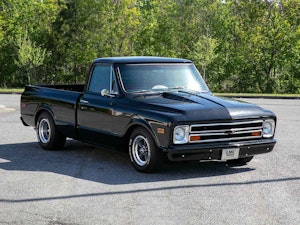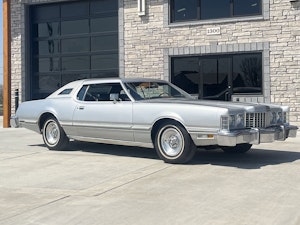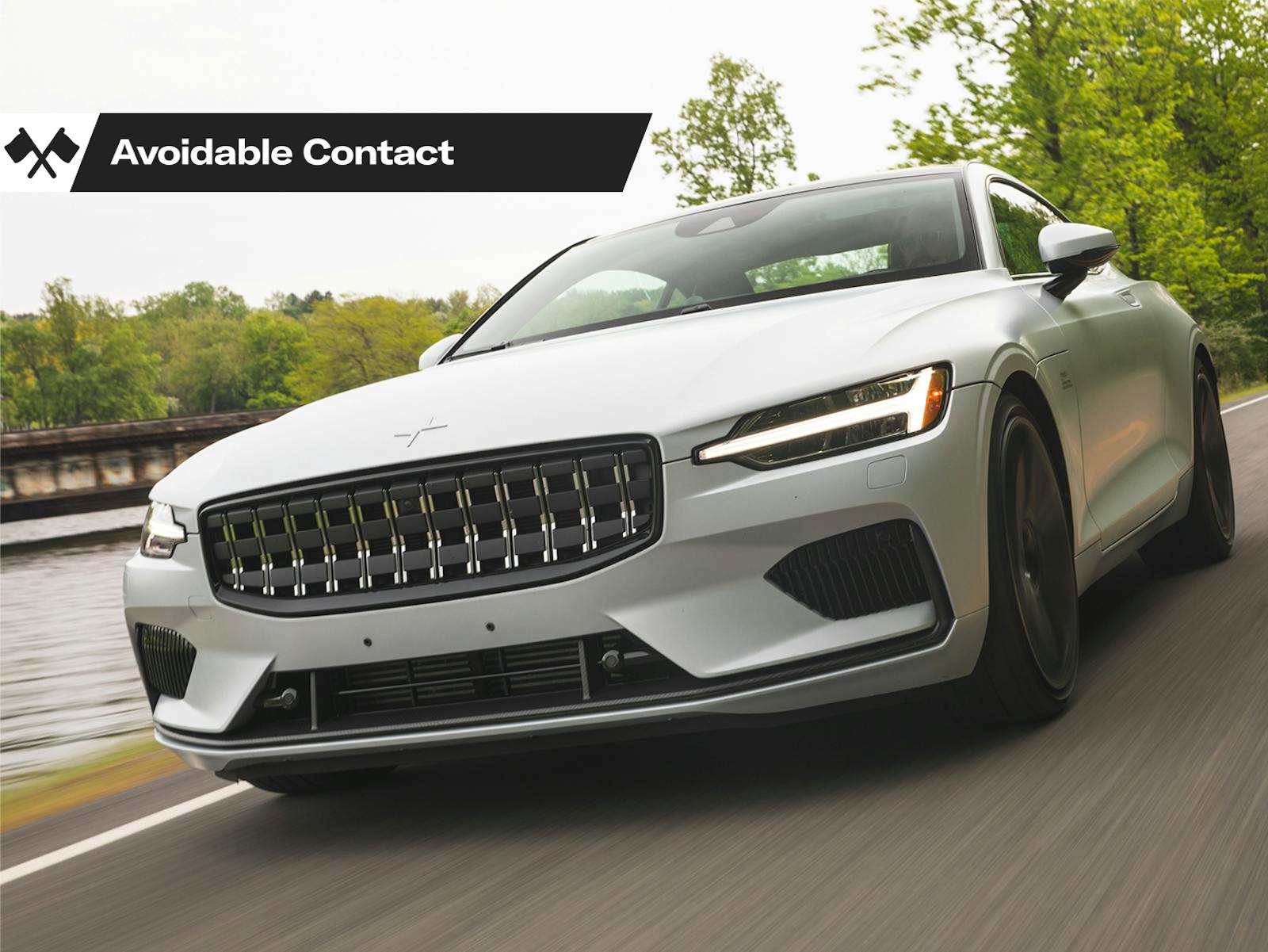Media | Articles
Avoidable Contact #150: Mercedes-Benz thinks they can cut the crap

Only now can the full story be told: your humble author once seriously considered the purchase of a new C230K “sports coupe,” as shown in the picture above. It was the summer of 2002. I went to the dealership, took the test drive, ran the numbers, talked to a bank … then bought a new Land Rover Discovery 4.6 instead. Compared to the very nice 2001 BMW 330i Sport we already had in the garage, this newest and most, ahem, affordable version of the famous “Cheap-Class” was hugely depressing both inside and out. The plastics looked and felt like they were straight out of my 1995 Plymouth Neon.
No, not the one I race now.
Not the one I raced before, either.
The street car I bought new in 1995 and traded in on a new stick-shift Land Rover Discovery in 1997.
I think I’ve admitted to this in the past.
Marketplace
Buy and sell classics with confidence
Anyway.
Everything about the C230K appeared designed to chastise and/or punish the purchaser for not buying the slightly more expensive C240 sedan. Keep in mind that the C240 sedan was not exactly a Maybach in terms of interior materials anyway, so the Benz boys had to dig pretty deep into The Bucket Of Humiliating Plastics in order to make their point. The shift knob, in particular, appeared to be lifted directly from a European-market Mercedes van. In those days, Mercedes had a real knack for making unappealing manual transmissions. I think the firm’s engineers secretly hated anybody who wouldn’t allow the gears to be shifted by superior German automatic technology, and they designed the boxes accordingly.
The C230K wasn’t fun, it wasn’t fast, it didn’t handle, and it showed every signs of being the Porsche 944 of Mercedes-Benzes, by which I mean “the car where the person finds out which model of a particular brand you actually have and you can actually see the condescension building up in their face before they start speaking.” My younger readers, who grew up surrounded by rolling insults to brand equity as diverse as the Porsche Macan and the Porsche Cayenne, probably don’t understand what I’m talking about here, but take it from me, there was once a time in American history where owning “A Porsh” meant that you had a real-deal 911, owning “a Bimmer” meant that you were at least driving a 320i, and owning “A Benz” meant nothing less serious than a clattering but indestructible 240D sedan stuffed to the gilled taillights with equally indestructible MB-Tex.
Those safe assumptions have been absolutely waterboarded in the past few decades. Porsche is now primarily a manufacturer of light trucks with a sideline in consumer bibelots capable of following a Corvette at an appropriately respectful distance, while Benz and BMW are now manufacturers of light trucks with sidelines in 2,500-kilogram triple-turbo ground-pounder sedans. Imagine telling a Rip van Winkle from 1984 about the market segment inhabited by the Macan, the X3, the GLC-whatever (isn’t that a Mazda?), the Audi Q5, the Tiguan …
… and when you get done helping them understand that, you can discuss the fact that most of these vehicles have “coupe” variants. I’d say nobody will ever be nostalgic for this trash, but I dimly remember people saying the same thing about the 1977 Cutlass Supreme, which I adore.
Also, there’s a chance, a probability even, that the next thing in cars will be even worse than the current thing.
In the past decade or so, we’ve been asked to swallow a pair of eminently contradictory propositions in true Newspeak fashion. The first proposition is:
Every automaker must compete in all market segments in order to survive. The second proposition is:
Every automaker must have partners and/or shared ownership in order to survive.
In the case of Porsche, the contradiction is obvious to see. We were told that the Cayenne was necessary to preserve Porsche’s independence. Well, Porsche is now a VW subsidiary thanks to some wacky boardroom adventurism so the Cayenne shouldn’t be necessary any more, right? Right. You can make fun of “Stellantis” all you want, but the newly assembled company does appear to be letting its individual brands stick to their individual knitting, with encouraging results.
Which brings us to the new announcement from Mercedes-Benz, excerpted below:
Mercedes-Benz will recalibrate its product portfolio, allocating more than 75 percent of its investments to develop products for the most profitable market segments. As part of this sharpened strategy, Mercedes-Benz aims to grow the sales share of its Top-End vehicles by around 60 percent by 2026 versus 2019 … In the Entry Luxury segment, Mercedes-Benz will reduce the number of model variants from seven to four while significantly elevating the technological substance of these products.
Let me put that in layman’s terms for you: Mercedes-Benz has relentlessly expanded its cheap-car offerings over the past 30 years, and the brand’s prestige has suffered as a result, so it’s going to walk most of it back and focus on making its bread-and-butter high-end stuff more profitable.
As a former 190E 2.3-16 and 560SL owner, plus someone who would like to own a recent E-Class, I whole-heartedly approve of these changes. Mercedes-Benz does not need to be everything to everyone. Forty years ago, the brand had magic presence in the United States. It could happen again, with enough time and effort. There is no reason for one company to sell both the A-Class and the S-Class Maybach. You can’t focus on both.
Of course, there’s a sinister side to this transformation as well: No doubt the people who run DaimlerAG, shortly to be known as the Mercedes-Benz Group, know a lot more about future governmental plans for “mobilty” and whatnot than you or I might. No doubt they are hearing about plans to reduce the access of everyday people to privately-owned automobiles, all the better to clear the highways for the plutocrats in their S-Classes. If a company as historically savvy and clued-in as Mercedes-Benz starts dialing back on affordable vehicles, that’s a message worth examining closely.
Let’s hope I’m just wearing a tinfoil hat here, and that this move is exactly what it looks like: a long-overdue effort on the part of a very competent automaker to recapture some of its mojo, reputation, and brand equity. With the sole exception of people who won’t be able to get a new GLB250 when their current one reaches end-of-lease, who wouldn’t be excited about that? We’re talking about Making Mercedes-Benz Great Again! Give it a decade or two, and we might get back to the point where the natural response to:
“I drive a Mercedes-Benz” is …
“Neat!” instead of a single eyebrow lifted “The Rock” fashion and an accusatory,
“Which Mercedes-Benz?” Even better, this sort of intelligent self-restraint could lead to imitation elsewhere. What if BMW decided it could do without a front-wheel-drive entry-level sedan, the same way it did without one for a mere 80 years or so? I know, I know, we’re really dreaming out loud here but: What if the next vehicle from Porsche was a sports car? It’s best not to get too worked up, lest we start talking about “the return of the Celica” or something similarly insane.
Consider the new S-Class. It’s a very good car, and about all you can say against it is that the idea of Benz ownership no longer conveys much prestige on its own. Take that unpleasant reality away, and suddenly it’s 1982!
These things happen in cycles, of course. If Mercedes-Benz fixes its brand to the point where people no longer ask “Which Benz?” then eventually one of the company’s lizard people will be tempted to cash in on that equity. Cue the cheap plastics, ugly styling, willful cost savings. The temptation to create a new C230K “Sport Coupe” will reach infinity.
If you go shopping for one in 2032, please feel free to let me know how it compares to the 1995 Plymouth Neon.









